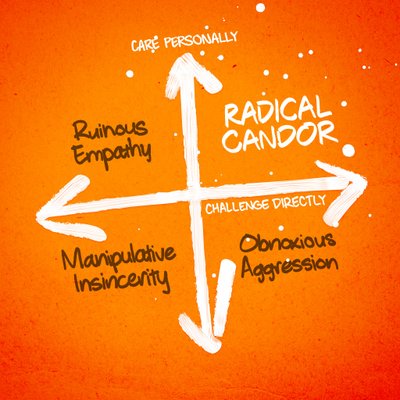By reading this blog post you'll learn: an importance of naming elusive things, that surplus of empathy can cause a lot of harm, why sometimes being unpopular is not that bad, that even Dale Carnegie was sometimes wrong (or at least not 100% right)
Internet & libraries are full of advices, techniques & "golden rules" for leaders & managers. Some are very general, some are laser-sharp specific.
Some are all too obvious, some may be even contradictory :)
I don't have my specific ruleset. In general I try to be flexible & fit the environment I work within, but there are certain principles I've shamelessly stolen from someone & I try to apply them everywhere I am. One of them is radical candor.
I've snatched the term from Kim Scott's book (my review here) - initially it (the book) didn't impress me - I loved the concept, but I've found it a perfect example of too much form around too little of substance. However, with time, I've learned that sometimes just naming something ephemeral with a proper name to frame the elusive concept is a great value itself.
OK, but what is radical candor?
My definition actually differs a bit from what Kim Scott has written:
Radical candor is being honest, direct & straightforward with everyone you co-operate with (bosses, peers, subordinates, everyone), even if it means speaking things that are inconvenient, may hurt someone's feelings or could be omitted (e.g. because they won't bring immediate value for org).
Kim uses a nice visualisation, that presents the idea far better than any definition I could have shaped anyway:

Definition or image, this could use some clarification & elaboration :)
Honest
It's honest because it's based on care, not on a wilingness to hurt someone, satisfaction of being triumphant or just giving vent to you accumulated aggresion (Kim calls it "obnoxious aggression"). There's a huge difference between being honest & being an asshole.
Honest means that sometimes the message is not pleasant & can affect your relationship with the receiver, but as Kim states in her book (paraphrase, for the sake of brevity): it's better to be unpopular than friendly, who can't be critical.
Direct
Forget the feedback sandwich, don't twist/fake the truth, don't calculate whether it will pay off to be sincere or not (Kim calls it "manipulative insincerity"). Don't hesitate to act if everyone else pretends not to see ("I assume everyone realised that. I assume someone has already said that for sure.").
The less you assume, the better.
Don't fall into the other extreme either - don't "save" someone honest feedback just because you think they may take it too personally & emotionally (Kim calls it "ruinous empathy").
Radical
The most controversive adjective & it's in the concept's name :) Let's illustrate it by ... questioning it!
Didn't famous Dale Carnegie write in his classic that:
- one should not criticize, condemn or complain
- one should focus on giving honest and sincere appreciation
- the only way to get the best of an argument is to avoid it
His book remains valid & very valuable until this very day - there's no doubt about that. So isn't that in conflict with radical candor?
Well, yes and no. Carnegies book is very general, while radical candor is focused on team's internal relationships. While that's true that it's good to maintain good relationship in ANY environment (there are things you won't tell your client ...), fair, effective & development-friendly work environment can't put relationship over general greater good (the word "care" is used by Kim for a reason) - of BOTH the team & the person you're candid in front of.
Yes, that sounds radical, but that also sounds right.
But why is randical candor so important tool in my repertoire? Because it's just ... easier. Saves time one would spend on dirty games, working things around, politicking to reach the target due to manipulations & calculated insincerity. It may sound naive, but I believe that common sense, facts & honesty should always win in the end in every healthy environment. If in particular case they don't, well ... I guess it'd be the highest time to look for another one.
Pics: © 2018 Radical Candor, LLC








